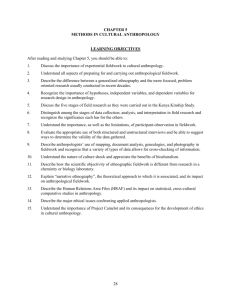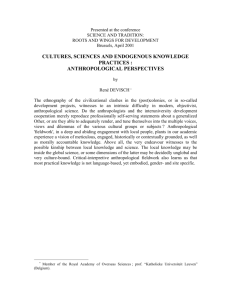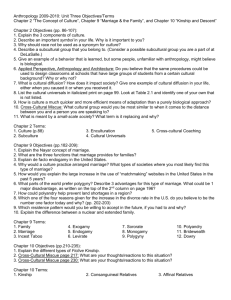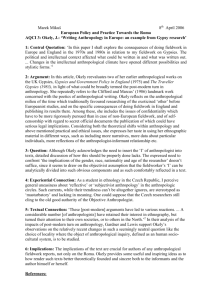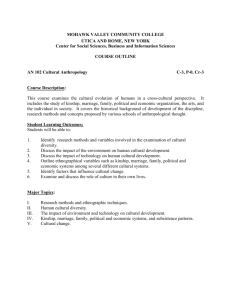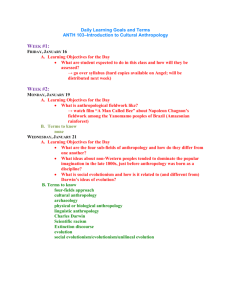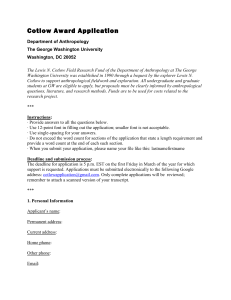Daily Learning Goals & Terms
advertisement
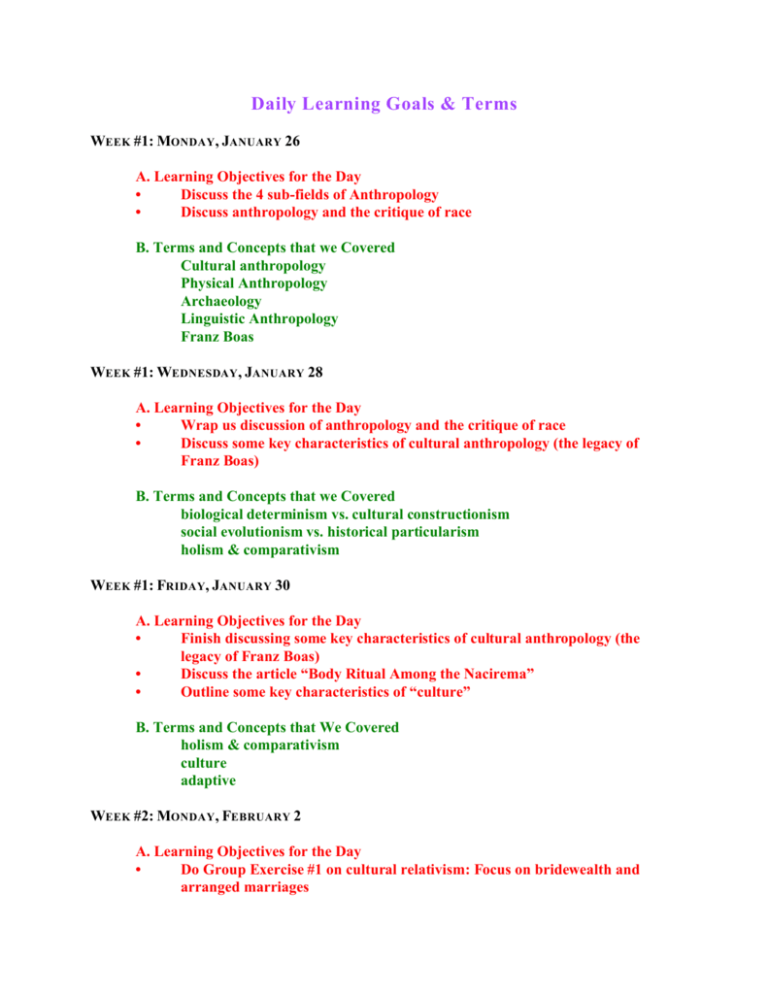
Daily Learning Goals & Terms WEEK #1: MONDAY , JANUARY 26 A. Learning Objectives for the Day • Discuss the 4 sub-fields of Anthropology • Discuss anthropology and the critique of race B. Terms and Concepts that we Covered Cultural anthropology Physical Anthropology Archaeology Linguistic Anthropology Franz Boas WEEK #1: WEDNESDAY , JANUARY 28 A. Learning Objectives for the Day • Wrap us discussion of anthropology and the critique of race • Discuss some key characteristics of cultural anthropology (the legacy of Franz Boas) B. Terms and Concepts that we Covered biological determinism vs. cultural constructionism social evolutionism vs. historical particularism holism & comparativism WEEK #1: FRIDAY, JANUARY 30 A. Learning Objectives for the Day • Finish discussing some key characteristics of cultural anthropology (the legacy of Franz Boas) • Discuss the article “Body Ritual Among the Nacirema” • Outline some key characteristics of “culture” B. Terms and Concepts that We Covered holism & comparativism culture adaptive WEEK #2: MONDAY , FEBRUARY 2 A. Learning Objectives for the Day • Do Group Exercise #1 on cultural relativism: Focus on bridewealth and arranged marriages B. Terms and Concepts that We Covered none WEEK #2: WEDNESDAY , FEBRUARY 4 A. Learning Objectives for the Day • Finish Group Exercise #1 on cultural relativism and compare ethnocentrism and cultural relativism • Begin film “A Man Called Bee: Fieldwork among the Yanomamo” B. Terms and Concepts that We Covered ethnocentrism cultural relativism WEEK #2: FRIDAY, FEBRUARY 6 A. Learning Objectives for the Day • Finish film “A Man Called Bee” • Mention, last key characteristics of “culture”: it is symbolic • Begin discussion of anthropological fieldwork: focus on participantobservation B. Terms and Concepts that We Covered symbolic Fieldwork participant-observation WEEK #3: MONDAY , FEBRUARY 9 A. Learning Objectives for the Day • Discuss film “A Man Called Bee” • Continue discussion of anthropological fieldwork: Other methods besides participant-observation Discuss articles: “Dr., Lawyer, Indian Chief” “Eating Christmas in the Kalahari” B. Terms and Concepts that We Covered key informant/consultant WEEK #3: WEDNESDAY , FEBRUARY 11 A. Learning Objectives for the Day • Continue discussion of anthropological fieldwork: the paired goals of ethnology and ethnography Advantages vs. disadvantages of anthropological fieldwork Discuss excerpt from Aman: Story of a Somali Girl B. Terms and Concepts that We Covered ethnography vs. ethnology female genital cutting (FGC) WEEK #3: FRIDAY, FEBRUARY 13 A. Learning Objectives for the Day • Wrap up discussion of FGC (female genital cutting) • Wrap up discussion advantages vs. disadvantages of anthropological fieldwork • Go over film guide for “N!ai: Story of a !Kung Woman” B. Terms and Concepts that We Covered WEEK #4: MONDAY , FEBRUARY 16 A. Learning Objectives for the Day • Begin discussing subsistence strategies º focus on foraging *refer to excerpt from Nisa: The Life and Words of a !Kung Woman B. Terms and Concepts that We Covered Foraging fissioning infanticide & senilicide diseases of development gatherer-hunters “The original affluent society” WEEK #4: WEDNESDAY , FEBRUARY 18 A. Learning Objectives for the Day • Continue discussing subsistence strategies º focus on pastoralism *refer to “Beating the Odds in Arid Africa” º focus on horticulture *refer to “Guaraní Production”, from the book Forest Dwellers, Forest Protectors B. Terms and Concepts that We Covered pastoralism transhumance nomadism horticulturalism WEEK #4: FRIDAY, FEBRUARY 20 A. Learning Objectives for the Day • Continue discussing subsistence strategies º focus on horticulture *refer to “Guaraní Production”, from the book Forest Dwellers, Forest Protectors º focus on agriculture *refer to “The Worst Mistake in the History of the Human Race” B. Terms and Concepts that We Covered slash-and-burn extensive cultivation fallow intercropping monocrop agriculture WEEK #5: MONDAY , FEBRUARY 23 A. Learning Objectives for the Day • Finish discussing subsistence strategies º wrap up overview of agriculture *refer to “The Worst Mistake in the History of the Human Race” and “Death without Weeping” • Begin Discussing anthropological approaches to gender g The Sexual Division of Labor B. Terms and Concepts that We Covered Progressivist versus revisionist versions of human pre-history “Complex societies” culture of poverty social construction of gender sex versus gender 3rd gender berdache & hijra WEEK #5: WEDNESDAY , FEBRUARY 25 A. Learning Objectives for the Day Group work on To Hunt in the Morning (go over questions from guide) B. Terms and Concepts that We Covered maloca matrilocal shori nawa and yura futsu WEEK #5: FRIDAY, FEBRUARY 27 A. Learning Objectives for the Day • Discuss movie “Guardians of the Flutes: The Secrets of Male Initiation” B. Terms and Concepts that We Covered rites of passage menstruation huts WEEK #6: MONDAY , MARCH 1 A. Learning Objectives for the Day • Continue discussing gender: g The universal subordination of women: conceptualizations Culture / nature Public / private g The Social Construction of Gender B. Terms and Concepts that We Covered social construction of gender sex versus gender 3rd gender WEEK #6: WEDNESDAY , MARCH 3 A. Learning Objectives for the Day • Watch the film “A World without Fathers or Husbands” WEEK #6: FRIDAY, MARCH 5 A. Learning Objectives for the Day • Finish discussing the Social Construction of Gender ºFocus on 3rd genders: the hijras of India • Define and discuss marriage g define marriage g Discuss anthropological approaches to the study of marriage g Review marriage types g Discuss the film “A World without Fathers or Husbands” and the article “Land of the Walking Marriage” B. Terms and Concepts that We Covered berdache & hijra marriage polygamy (polygyny and polygamy) verus monogamy serial monogamy woman marriage levirate & sororate WEEK #7: MONDAY , MARCH 8 A. Learning Objectives for the Day • Finish discussing the film “A World without Fathers or Husbands” and the article “Land of the Walking Marriage” • Discuss some other relevant topics concerning the institution of marriage g Group affiliation of marriage partners g Exchange of goods between the families of marriage partners g Residency of married couple • Focus on polygyny B. Terms and Concepts that We Covered endogamy versus exogamy bridewealth and dowry patrilocal/virilocal matrilocal/uxorilocal neolocal WEEK #7: WEDNESDAY , MARCH 10 A. Learning Objectives for the Day • Focus on polygyny º discuss the excerpt “Wamutirua: The First Wife” (from the book Voices from Mutira) and the article “Women’s Perceptions of Polygyny among the Kaguru of Tanzania” • Focus on fraternal polyandray º Discuss the article “When Brothers Share a Wife” • Focus on woman marriage º Discuss the article “Is the Female Husband a Man?” B. Terms and Concepts that We Covered age-sex demographic charts primogeniture MAPPING 1. 2. 3. 4. 5. 6. 7. 8. 9. 10. 11. 12. 13. Brazil: Somalia: Namibia: (or Botswana) Kenya: The Yanomamo people of the film “A Man Called Bee” Somali people of the excerpt from Aman: Story of a Somali Girl !Kung San of excerpt Nisa: The Life and Words of a !Kung Woman and film “N!ai: Story of a !Kung Woman” Turkana pastoralists from the article “Beating the Odds in Arid Africa” Paraguay: Guaraní horticulturalists from the chapter “Guaraní Production” Brazil: Favela (shanty-town) dwellers in article “Death without Weeping” Peru: Sharanahua people of the book To Hunt in the Morning Papua New Guinea Sambia people of the film “Guardians of the Flutes” China Mosuo people of the film “A World without Fathers or Husbands” and article “Land of the Walking Marriage” Kenya Gikuyu women of the excerpt “Wamutirua: The First Wife” from Voices from Mutira Tanzania Kaguru women of the article “Women’s Perceptions of Polygyny among the Kaguru of Tanzania” China (Tibet) ethnic Tibetans from the article “When Brothers Share a Wife” Kenya Nandi people of the article “Is the Female Husband a Man?” %%%%%%%%%%%%%%%%%%%%%%%%%%%%%%%%%%%%%% M IDTERM E XAM Date: Friday, March 12 d You are responsible for studying: Ë all readings (book(s) & articles) Ë all films Ë all lecture notes Ë all handouts Ë world map (you must identify all of the places above) d Tips: Ë Use this document as a study guide Ë Read over the posts made on the Blackboard discussion board to reinforce key ideas from the readings d Policy on make-ups: If you miss the mid-term exam you forfeit your mid-term exam grade unless you have a truly serious illness, injury, or emergency and have contacted me before the exam (unless impossible). d Excluded from Midterm Exam: pages 54-66 of the book To Hunt in the Morning (these pages concern kinship) and questions 12-17 from the guide for this book
